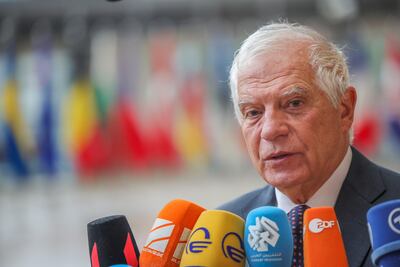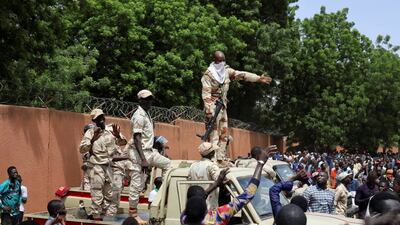The EU’s chief diplomat Josep Borrell on Monday said that Brussels fully supported “all measures” adopted and proposed by African leaders following a military coup in Niger last week.
The measures, announced in a statement on Sunday, may include the use of force if the junta does not give up power within a week.
“The EU supports all the measures adopted by Ecowas [the Economic Community of West African States] in response to this coup and will support them quickly and resolutely,” said Mr Borrell.
His comments come two days after the EU suspended budget support to Niamey as well as all security co-operation activities.
The total loss of aid from the EU for Niamey is about €290 million ($320 million) in budget and security support, an EU official told The National.
This includes €70 million that was supposed to be disbursed in October and €100 million that had been scheduled for next year.
Niger was supposed to receive €503 million ($555 million) for the period 2021-2024 via the EU's flagship multiannual indicative programme.
Other countries, including France, have also suspended development and budget aid to Niger. France's development support to the country reached €120 million ($132 million) in 2022.
Niger is a key western ally in its fight against extremist groups in the Sahel. The EU has sent between 50 and 100 troops on a three-year military training mission, according to Reuters. France has 1,500 troops present in Niger while the US has 1,100.
It is also one of the poorest countries in the world, receiving close to $2 billion a year in total in official development assistance, according to the World Bank.
It remains unclear what the EU's public support of Ecowas, a regional alliance of 15 countries headquartered in Nigeria, entails outside of political backing for its decisions regarding Niger.
The coup has been widely condemned around the world, including by the US, Algeria and the UN Security Council.
The African alliance, which has intervened militarily in the past in some African countries such as The Gambia, has not requested outside military support.
Ecowas said that it considered the detention of democratically elected President Mohamed Bazoum, who remains under house arrest with his family, to be a “hostage situation”.
Should Mr Bazoum not be reinstated within a week, Ecowas may “take all measures necessary to restore constitutional order in the Republic of Niger”.
Ecowas said that these measures “may include the use of force” and that chiefs of defence staff would “meet immediately”.
It issued several sanctions against Niger, including closing land and air borders as well as the freezing of Nigerien assets.
The alliance also condemned pronouncements of support for the coup by “foreign governments and foreign private military contractors” in an apparent reference to the head of Russia's Wagner Group, Yevgeny Prigozhin, hailing the coup and offering his fighters’ services to bring order.

In a voice message on Telegram released on Saturday, Mr Prigozhin described the coup as a moment of overdue liberation from western colonisers, amid concerns from the West that the coup may give Russia more influence in the region.
The latest events in Niger come one year after a similar coup in Burkina Faso and three years after Mali's president was overthrown by the army, paving the way for Wagner to become active in the country.
Burkina Faso and Mali are the only African countries to have not condemned the coup.
Anti-French sentiment is also on the rise in Niger, with France formerly ruling the country between 1922 and 1960.
In Niamey, thousands of protesters waving Russian flags on Sunday and attacked the French embassy amid rumours that some of Mr Bazoum’s ministers had taken shelter there. Local security forces dispersed the attackers.
The office of French President Emmanuel Macron told Paris-based media that he “will not tolerate any attack against France and its interests”.
There are currently between 500 and 600 French citizens living in Niger.
French multinational mining company Orano Niger said its activities have not been disrupted so far. Roughly one third of French uranium imports come from Niger, according to French daily Liberation.
The French Foreign Affairs Ministry said on Sunday that it had reinforced security at its embassy in Niamey following “unacceptable violence”.
The embassy had been “violently attacked” by “visibly prepared groups, which the Nigerien security forces failed to fully control”.
“Contrary to what some Nigerien military officials claim, no lethal means were used by the French security forces,” the ministry said on Monday.
Mr Borrell said in his statement that no authority other than Mr Bazoum’s can be recognised.
“He must regain, without delay and without conditions, the freedom and fullness of his office,” said Mr Borrell.
The junta has responded by criticising both Ecowas and France.
It justified the attacks against the embassy, saying they were caused by “resentment resulting from the destabilising attitude of a western chancellery”, according to the French newspaper Le Monde.
Col Maj Amadou Abdramane, one of the soldiers who ousted Mr Bazoum, claimed on Monday that the toppled government had authorised France to carry out strikes at the presidency to try to free the President. He gave no proof for his claims.
On Sunday, Col Maj Abdramane accused the Ecowas meeting of making a “plan of aggression” against Niger and said the country would defend itself.
“Tensions with the military are still ongoing. There could be another coup after this one, or a stronger intervention from Ecowas, potentially military force,” Tatiana Smirnova, a researcher in conflict resolution and peace missions at the Centre FrancoPaix, told AP.
“Many actors are also trying to negotiate, but the outcome is unclear.”
The reason for the coup in Niger is not currently known, but analysts say that it was triggered by internal power struggles.


